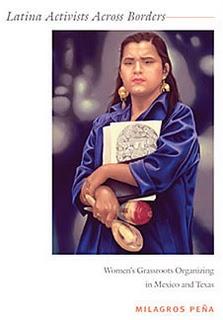Latina Activists Across Borders: Women's Grassroots Organizing in Mexico and Texas

Milagros Pena’s book, Latina Activists Across Borders, is a significant attempt at recording the oral histories of women responsible for developing and running NGOs (non governmental organizations) in Mexico and the border cities of El Paso, Texas and Ciudad Juarez. This particular kind of work is necessary to further understand how women organize as activists outside of more privileged academic, feminist settings.
As a feminist who chose to leave the academy, I am often baffled by how women comfortably practice their feminist values outside the sanctuary of women’s studies departments and women’s centers on college campuses. In many ways, practicing feminism outside of the ivory tower takes guts, particularly in those parts of the U.S. (and elsewhere) that insist men and women practice and participate in traditional gender roles. Pena’s book provides some insight on how women outside of the academy practice feminist values in what could be considered hyper-patriarchal locations.
The notion of taking “baby steps” has a very real impact in places where feminist ideas and beliefs are considered foreign, feared or maligned. I was impressed by one interviewee from Michoacan when she proclaimed what an achievement it was for women to meet (outside of the home) to discuss feminist-informed initiatives. Of course, there are places in the U.S., other than the border, where minute actions would also be considered quite significant—the small, southern town where I live, for example.
The importance of networking between NGOs, even those with a religious impetus, is vital for the survival of these grassroots efforts. It is important to note, that the organizers interviewed in Mexico saw a natural relationship between the goals of organizations with religious roots and those with more feminist ones. In other words, they were not mutually exclusive. Both types of organizations worked to help those in need. Yet, many of the women in Mexico were careful about labeling their efforts feminist since local reactions to preconceived, reduced views of what feminism entails (primarily, those who reduce it to “man hating,” and those with religious reasons for resisting feminism) are rather entrenched. Instead, these organizers have labeled their activism as part of a “woman’s movement” to help soften the edges of public misperceptions of feminism. While this magical renaming no doubt helps to get women in the door that need the services and programming these NGOs provide, it also has the potential to further entrench the idea that feminism is something to be feared, denigrated and resisted.
The book is worth reading for those who work in NGOs, study feminist theory or consider themselves feminists. The tone is academic, as is the language, but the excerpts from the transcripts are quite interesting and warmer in tone than the whole of the book. There are varied ways of practicing feminism and this book underscores those multiple practices as being necessary for surviving a patriarchal and capitalist reality.